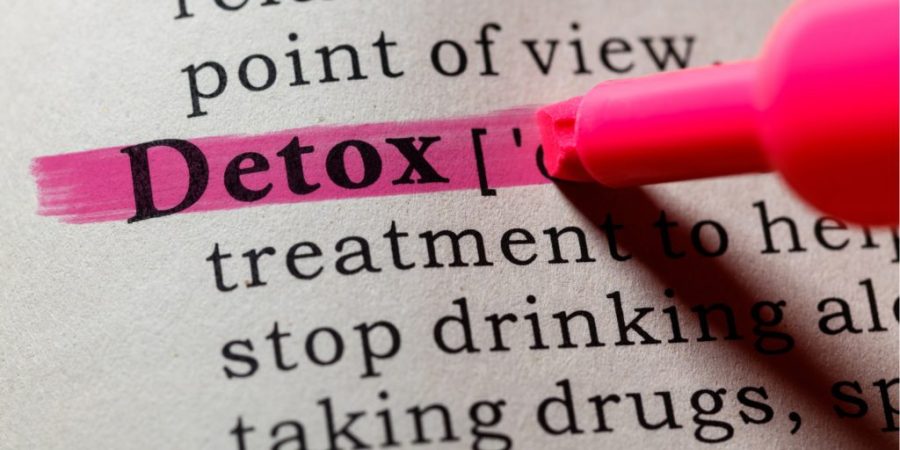
An occasional drink or two probably won’t cause a problem in your life. But when you start drinking every night or regularly binge drinking, your body starts to adapt to its new conditions. In time, you might find it difficult to function normally without having a drink, which can lead to inspiration to quit drinking. But quitting drinking and allowing your body to return to its normal state—called detoxing—can lead to a wide range of withdrawal symptoms. For some, detox symptoms can be as mild as a slight headache, and for others, symptoms can be debilitating or even life-threatening.
In this article, you’ll learn about the different symptoms of detox and withdrawal and how to quit drinking safely.
Table of Contents
What Is Detoxing?


Detoxing is your body’s process of getting alcohol and other drugs completely out of its system. It is both a physical and a mental process. On the physical side, your body undergoes its normal functions of processing and clearing out any drugs or alcohol, which is primarily accomplished through your liver. From a mental perspective, detoxing means managing irritability, cravings, and other alcohol withdrawal effects.
Detox is the first step toward alcohol addiction recovery. During detox, your body will experience the shock of operating without the presence of alcohol. It is by no means an easy process, but with positive support and professional supervision, it can be safe and effective. And after a successful detox, you can move forward with counseling, therapy, and other treatment methods to ensure a long-lasting recovery.
How Long Does Detoxing Take?
How long a detox can take depends on how long and how heavily you’ve been using. While it may only take a few days for your body to flush out any harmful chemicals, it can take weeks or even months to rewire your brain and overcome cravings.
The worst detox side effects begin to subside for most individuals after five to seven days. These are the immediate, pressing issues usually treated by an alcohol detox program. But less severe symptoms may persist for several weeks, which can make staying in treatment a very beneficial choice.
Alcohol Detox Symptoms
Everyone experiences alcohol detox differently. When you stop drinking, the detox symptoms you’ll encounter will depend on a few factors: how long you’ve been drinking, how heavily you drink, your medical history, and your history of addiction. Alcohol detox symptoms can be divided into three stages according to severity:
Stage One Detox Symptoms:
- Minor tremors or “the shakes”
- Stress or anxiety
- Nausea or lack of appetite
- Sweating
- Headaches or lack of focus
- Mood swings
- Heart palpitations
Stage Two Detox Symptoms:
- Confusion
- Irritability
- Increased blood pressure
Stage Three Detox Symptoms:
- Fever
- Seizures
- Delirium tremens
Within the first eight hours of your detox, you’ll likely start experiencing alcohol withdrawal headaches and some trembling in the hands (known as “the shakes”). You might also experience some other symptoms, from nausea and sweating to anxiety and mood swings. These stage one symptoms tend to peak after 72 hours and slowly diminish over the next three to four days.
Stage two and stage three alcohol detox symptoms can appear suddenly a few days after you stop drinking, and they may last up to a week after you first quit. This is why you should never try to detox on your own. Detoxing in a safe, medically supervised setting with 24/7 support is much safer, and it greatly reduces your risk of relapse.
After five to seven days, most of the physical detox symptoms should start to taper off. Psychological symptoms like cravings and mood swings can last much longer, but these are usually addressed in an alcohol addiction treatment program.
Seizures and Delirium Tremens
Seizures and delirium tremens are the two most dangerous alcohol detox symptoms. You may be at higher risk of these withdrawal symptoms if you have a long history of alcohol use or you binge drink with heavy amounts of alcohol.
Seizures can be mild (petit mal seizures) or severe (grand mal seizures). Petit mal seizures last for around 20 seconds and can include symptoms like staring off into space, smacking lips, halting speech mid-sentence, or sudden stopping of all activity. Grand mal seizures are far more dangerous and can involve violent muscle contractions, loss of consciousness, and convulsions. These severe seizures can lead to injury or even death.
Delirium tremens, or DTs, are rare but severe withdrawal symptoms that progress from the more manageable stage one detox symptoms. DT symptoms include aggression, confusion, irritability, hallucinations, severe sweating, trembling and nausea. Delirium tremens is the most dangerous detox side effect and often requires intensive medical care to navigate safely.
How to Detox Safely Near Orlando, Florida


Safely detoxing is the first step toward complete alcoholism recovery. By removing alcohol from your body and managing withdrawal symptoms, you can move forward and seek out support that will help keep you from relapsing.
Detoxing from alcohol is not something you should attempt to do on your own. Quitting cold turkey means having no support when alcohol detox symptoms start to appear. And for many individuals, the only way to relieve those symptoms is to have another drink. Instead of trying the cold turkey approach, look into professional, medical detox options.
Getting treatment at a recovery center not only helps mitigate the risk factors of detoxing, it also improves your chances of staying sober in the future. Treatment centers help you navigate the detox process comfortably, with trained staff on hand to guide you through the process safely. Alcohol detox centers also provide patients with post-detox support like alcohol addiction recovery programming, which can help address the mental aspect of addiction.
Start Your Recovery Today
Detoxing from alcohol can sound scary, but it doesn’t have to be. Starting your recovery from alcohol addiction is easiest when you have expert support. With a professional, medically supervised detox, you can have the best chance at a successful recovery without experience severe side effects.
At The Blackberry Center, our nurses and physicians are dedicated to providing total support for our alcohol detox patients. We carefully monitor our patients’ symptoms and vitals 24/7. And our sober, retreat-like environment eliminates any chance of relapse.
If you’d like to learn more about how we can help you on your road to recovery, call our friendly staff at 888-512-9802 or fill out our confidential contact form. Alcohol detox symptoms are serious, but professional help can make all the difference in keeping you safe and sober.
The post Detox Symptoms: Alcohol Detoxification Explained appeared first on The Blackberry Center of Central Florida.
Source
Original Author: The Blackberry Center

